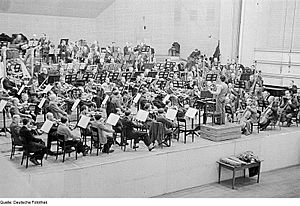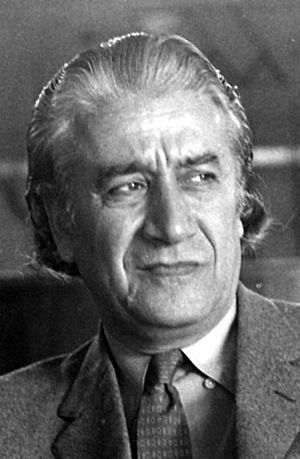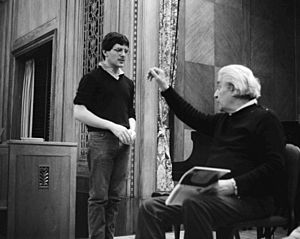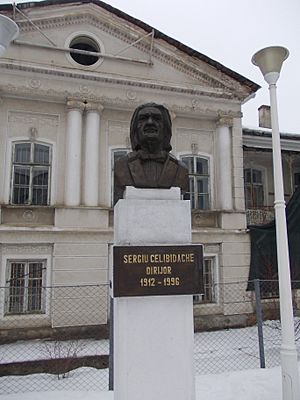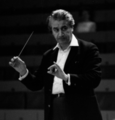Sergiu Celibidache facts for kids
Quick facts for kids
Sergiu Celibidache
|
|
|---|---|
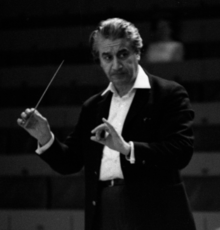
Celibidache in 1966
|
|
| Born | 28 June 1912 Roman, Romania
|
| Died | 14 August 1996 (aged 84) La Neuville-sur-Essonne, France
|
| Nationality | Romanian |
| Education |
|
| Occupation |
|
| Organization |
|
| Awards |
|
Sergiu Celibidache was a famous Romanian conductor, composer, and teacher. He was born on July 11, 1912, and lived until August 14, 1996. He studied music in Romania, Paris, and Berlin. His music career lasted over 50 years. He led many important orchestras, like the Munich Philharmonic and the Berlin Philharmonic.
Later in his life, he taught music at Mainz University in Germany and the Curtis Institute of Music in Philadelphia, Pennsylvania. Celibidache was special because he often didn't want his performances to be recorded and sold. He believed that truly experiencing music needed to happen live in a concert hall. He was also deeply influenced by Zen Buddhism. Many people consider him one of the greatest conductors of the 20th century.
Contents
Early Life and Learning
Sergiu Celibidache was born on June 28, 1912, in Roman, a small city in Romania. His father, Demostene Celebidachi, was a cavalry officer and government official. His mother was Maria Celebidachi. Sergiu started playing the piano and making up his own music when he was only four years old!
After finishing school in his hometown, he went to Bucharest and then to Paris to continue his studies. In 1936, he moved to Berlin, Germany, to attend the Hochschule für Musik (Academy of Music). There, he learned how to compose music and how to conduct an orchestra. He also studied philosophy and music history at the Friedrich Wilhelm University. He earned his degree in 1944.
During his time in Berlin, Celibidache learned about Zen Buddhism from his teacher, Martin Steinke. This way of thinking greatly influenced his life and his music. He once said that Zen helped him understand that "the beginning is the end," and that music shows this idea.
His Career as a Conductor
From 1945 to 1952, Celibidache was the main conductor of the famous Berlin Philharmonic orchestra. He got this big job right after World War II. He worked hard to help another great conductor, Wilhelm Furtwängler, return to lead the orchestra. From 1947 to 1952, they shared the conducting duties.
After his time in Berlin, Celibidache worked with radio orchestras in places like Stockholm, Stuttgart, and Paris. He also conducted in Britain. A famous pianist named Eileen Joyce said he was the best conductor she ever worked with. In 1970, he received the Sonning Award from Denmark, which is a big honor in music.
From 1979 until he passed away, he was the music director of the Munich Philharmonic. Teaching was also very important to him. He regularly taught at the Hochschule für Musik Mainz in Germany and at the Curtis Institute in Philadelphia. His classes were often free for anyone who wanted to learn.
He even appeared in a film called Ambassadors of Music in 1952. In the movie, he conducted the Berlin Philharmonic playing a piece by Ludwig van Beethoven.
Later Years and Passing
Sergiu Celibidache died on August 14, 1996, when he was 84 years old. He passed away in La Neuville-sur-Essonne, a town near Paris, France. He was buried there.
His Unique Performance Style
Sergiu Celibidache had a very special way of making music. He didn't focus much on making recordings. Even though many of his concerts were recorded, he saw them as just extra things. He believed that a true "transcendent experience" of music could only happen live in a concert hall.
His ideas were influenced by Zen Buddhism, especially the concept of ichi-go ichi-e, which means "one time, one meeting." This idea suggests that every moment is unique and can never be repeated. Because of this, he thought listening to recorded music couldn't give you the same deep feeling as being at a live concert.
Celibidache was known for spending a lot of time rehearsing with orchestras. He wanted everything to be perfect. In his later concerts, he often conducted pieces at a slower speed than usual. He felt that the sound of the room where a concert was held was very important. He believed that the way a hall sounded could actually change how musicians played, making the music feel alive and special. For him, a recording couldn't capture this magic because it lacked the live atmosphere.
Because his recorded performances were so different from others, they are often seen as special items for collectors rather than typical recordings.
Personal Life
In 1965, Sergiu Celibidache married Ioana Procopie Dumitrescu. They had one son together, named Sergiu Ioan Celibidache, who was born on June 19, 1968.
Honors and Awards
Sergiu Celibidache received many important awards and honors during his life. These show how much he was respected in the world of music and beyond:
- 1954: Grand Cross of Merit of the Federal Republic of Germany (Germany)
- 1955: Berliner Kunstpreis (Germany)
- 1970: Chevalier of the Order of Vasa (Sweden)
- 1970: Léonie Sonning Music Prize (Denmark)
- 1984: Franco Abbiati Prize (Italy)
- 1987: Nettuno d'oro (Italy)
- 1991: Bavarian Order of Merit (Germany)
- 1992: Honorary Citizen of the City of Munich (Germany)
- 1992: Honorary Member of the Romanian Academy
- 1993: Bavarian Maximilian Order for Science and Art (Germany)
- 1994: Honorary Doctorates from Iași Academy of Art and University of Iași (Romania)
- 1994: Honorary Citizen of Iași (Romania)
- 1994: Order of Merit of Rhineland-Palatinate (Germany)
- 1995: Commandeur des Arts et des Lettres (France)
Images for kids
See also
 In Spanish: Sergiu Celibidache para niños
In Spanish: Sergiu Celibidache para niños
 | Delilah Pierce |
 | Gordon Parks |
 | Augusta Savage |
 | Charles Ethan Porter |


